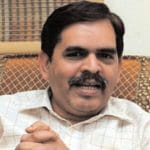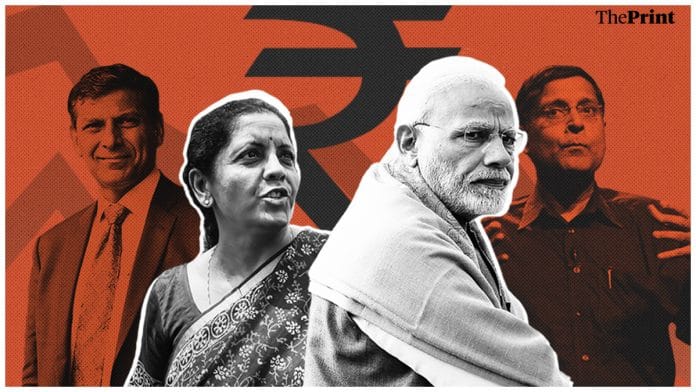India’s GDP has slipped to a six-year low, growing at five per cent in June quarter. Sectors like automobile, manufacturing and real estate are witnessing unprecedented slowdown. Former Prime Minister Manmohan Singh urged the Narendra Modi government to consult with “all sane voices and thinking minds” to revive the economy. Former RBI governor Raghuram Rajan also called the economic slowdown “very worrisome”.
ThePrint asks: Does Modi govt need world-class economists to help fight slowdown?
Lack of expertise and competence in PMO is matched by absence of a body like Planning Commission
 Mihir Sharma
Mihir Sharma
Economist and Senior Fellow at Observer Research Foundation
The Modi government is seriously short of economic talent. While economists of the undisputed calibre of Bibek Debroy and Rathin Roy do indeed serve on the Prime Minister’s Economic Advisory Council, there is no substitute to having in-house economic experts who can provide timely and relevant economic advice while policy decisions are being taken.
Unfortunately, Modi has taken his “hard work over Harvard” rhetoric seriously, and seems to think that generalist bureaucrats from the all-India services are acceptable substitutes for trained economists. This has led to a sequence of bad decisions — most recently on the matter of an unnecessary and counterproductive levy on foreign participants in the equity markets. Bureaucratic preferences were also allowed to dominate the structure of the GST, which was rendered more complex than economists would have liked. This has directly led to its underperformance — the Modi government was running short of revenue by almost a whole percentage point of GDP in the last financial year.
The lack of expertise and competence in the PMO is matched by the absence of a professional body such as the Planning Commission, which has been replaced by a PR-heavy NITI Aayog, and also by the lack of any serious economic advisers in many line ministries. The government simply lacks the competence and ability to match its rhetoric and meet its targets.
India doesn’t need ‘world-class economists’ but people who are closely connected to it
 Ashwani Mahajan
Ashwani Mahajan
National Co-Convener, Swadeshi Jagran Manch
It is important to understand that this slowdown is happening because of these world economists. We need people who are connected to India.
There is not actually a slowdown, it is more of a decline in some sectors of the economy. The FMCGs have seen growth. This is merely a case of cyclical ups and downs in the country’s economy. Even the UPA regime had witnessed slow growth between 2011 and 2013, and people started talking about the ‘Hindu rate of growth’.
The situation today is more of a ‘legacy issue’ – the legacy of the UPA is still hanging and this is evident in the continuing crisis of NPAs, NBFCs, and IL&FS. In fact, the IL&FS fiasco happened because of these ‘world-class’ economists. So, the concern should be not about bringing in a certain set of economists, but more about changing the mindset of India’s policymakers. They need to understand that the economic growth issue will not be solved through FDIs.
It was these Raghuram Rajans, Urijit Patels and Viral Acharyas who kept stopping reserves from the RBI, which legitimately belonged to the government.
We will soon be on the path of 8-9 per cent GDP growth. But the Modi government must curb the decline of the Indian rupee. This is possible if the government keeps a check on imports and raises tariffs, reduces the rate of interest, increases liquidity in the system, releases payment to MSMEs, helps the manufacturing sector, increases the income of farmers and participation of women inagriculture, reduces dependency on foreign investors and encourages corporate sector to start investing more.
Also Read: Slow economic growth is both immoral and anti-national. Don’t ignore falling GDP rate
To counter economic slowdown, Modi govt doesn’t need world-class economists — it needs common sense

Jayati Ghosh
Professor, Centre for Economic Studies and Planning, JNU
To counter this economic slowdown, the Narendra Modi government does not need world-class economists — it requires some basic common sense. I say this because it is evident that this slowdown points to a problem of inadequate demand. However, the government is still persisting with supply side measures, which is plain stupidity.
The Modi government has had an ‘ostrich syndrome’ for more than a year. Many economists have been pointing to problems in the economy and suggested strategies to address them. However, the ruling dispensation persisted in claiming that all was well. The government further suppressed some data and manipulated others. There are concerns about the new method for estimating GDP, and since no one outside the system has access to the database or the methodology used, the government could have at least made the entire process transparent.
One does not know how the Narendra Modi government works, but since demonetisation it has been evident that it functions in an extremely centralised way. It is also possibly the most opaque government we have seen in the history of independent India. This opacity is made worse by its stubborn insistence that everything is all right and also from its remarkable resistance to hard facts.
We need vibrant debate & political will to make hard choices and address issues, like unemployment
 Sabina Dewan
Sabina Dewan
President & Executive Director, JustJobsNetwork
The economic slowdown India is confronting has deep structural roots. The critical factors causing this are lack of productive jobs and good wages. There has been an uptick in the unemployment rate which is now at 6.1 per cent; informal employment (non-agriculture) remains stubbornly high at 68.7 per cent.
The dire situation with regards to employment is driving a deficit in aggregate demand. If people don’t have productive jobs and good wages, then they don’t spend. This low consumption creates a vicious cycle of reduced production and investment, which, in turn,adversely affects jobs and wages.
These indicators speak for themselves. To fight this slowdown, we don’t need more world-class economists to tell us what we already know
We already have many Indian economists, and seasoned experts and practitioners from other disciplines of world-class stature who have repeatedly warned us about how business as usual is not addressing the structural problems in the country’s economy.
What we need is a vibrant debate, political will and an appetite to make hard choices to address our country’s economic issues, particularly its employment challenges.
Also Read: Maruti Suzuki to shut down Gurugram and Manesar production plants for 2 days
Unwise to blame entire slowdown on govt policies. Modi is not the only one responsible here
 Rajesh Chakrabarti
Rajesh Chakrabarti
Professor and Dean, Jindal Global Business School
The current slowdown is certainly part of the business cycle, but has been aggravated by some of the steps taken by the Narendra Modi government in recent years, especially those that affected India’s informal sector. The question of whether world-class economists can save the day is probably a moot one. They haven’t been able to save the US economy from periodic downturns and outright crises.
The outcome on the economic front today has been caused by poor decision-making over the last five years. Given where India stands today, we certainly need some tough and traditional economic thinking. Cursory and half-understood references to behavioural economics should be best avoided as it can make matters worse.
The RBI and the North Block should take steps to alleviate the downturn; such measures are anyway usually taken by central banks and fiscal authorities. This is where traditional economic thinking is needed. The government needs to pay attention to the informal sector and steps should be taken to understand the pain points so that it can combat these challenges.
However, all said and done, there is no silver bullet in a downturn like this. Things will stay bad and we must accept it. The current slowdown is a combination of two factors — government policy as well as the usual business cycle. It is probably unwise to blame the entire slowdown on government policies. Modi is not the only one responsible here.
One would hope those advising the government are already world-class economists
 Arjun Jayadev
Arjun Jayadev
Professor of Economics, School of Arts and Sciences, Azim Premji University
This is an odd question. I would hope that whoever is advising the government is already a world-class economist. I believe that any government faced with a challenging situation would want to consult a wide variety of policymakers, business people, and stakeholders concerned.
Sometimes, the term ‘world-class’ is a euphemism for foreign-trained or foreign-based economists. I do not think that this is either necessary or sufficient for good policy advice. The expertise that economists gather from global experience and academia is very valuable, but India has also been served very well by a large number of economists and thinkers who have a profound and hard-earned sense of the Indian economy and its particular patterns. These economists can certainly provide much-needed guidance.
I suspect there is no end to advice that people are willing to give – it is in their nature to do so in times of crisis. The government should be open to ideas and sift through suggestions in an effective manner; perhaps, most importantly, it needs to think through policy actions rather than experiment and hope for the best.
By Revathi Krishnan and Taran Deol







You could have the worlds best economist but Modi would not listen to him or her. Modi only listens to Modi!
“World class economists” have not covered themselves in glory anywhere in the world. Most of them turned out to be the “voodoo” type with mythical theories and no practical and beneficial advice or policies. One must remember that Economics is not a science, however much the practioners pretend otherwise!. So no need for any of them, but a sense of responsibility and common intelligence from the ministers and officials will suffice.
We have world class Economists within India. Manmohan Singh for example, who is willing to help despite political differences.
Caravaan guzar gaya, Aur hum dekhte reh gaye. Africa is the new India, so no more jokes about Somalia please. 1.3 billion people, a GDP of $ 3.4 trillion, increasing economic integration. Abundant mineral, energy, agricultural resources, a young, growing population, what we used to fondly call our demographic dividend in the good old days. Some world class manufacturing, to take advantage of wage rates going up in China and elsewhere. India needs to up its game, swiftly, or we will be left with Bollywood, cricket, yoga, some odds and ends, our quest for a permanent seat. In a globalised world, everyone is out to steal everyone else’s lunch.
On the face of it, we have the skills needed to remedy the current economic situation (low consumption and liquidity crisis). But we must also want to listen to them. Then, we must ask ourselves an essential question: is growth-consumption the mode of development in the country? Is this the dream of the founding fathers of India? Finally, it is unfortunate that the personalities consulted did not dare to say that the political discourse should focus on slowing down the country’s economy instead of focusing on what has not been done for 70 years.
Modi administration doesn’t need world class economists. It only wants freebies subsidies reservation loan waivers and chants of Jai Karl marxa Jai socialism.
World class economists brought India into twin deficit scenario – much worse than just a slowdown in growth.
World class economists created a free money credit culture that seeded the NPA disaster whose after effects we are still dealing with.
World class economists have failed in a world class manner in Japan, Europe, US and now India is expected to follow the same path ?
under the umbrella of a global trade war , contraction in China, Asia and Europe – India’s economy has withstood these changes and the dramatic GST, BS-6 and other challenges like champions. Talk of recession is liberal wet-dreams – not economic reality.
A government faced with such forbidding tasks needs all the world class talent money and love for country can buy. This aversion to incandescence of intellect is inexplicable, arises out of deep rooted feelings of inadequacy. As Ms Jayati Ghosh points out, it also needs a great deal of common sense, uncommonly rare nowadays. However, that is not the crux of the problem. What needs to change completely is the style of decision making. Of an ability to listen with genuine curiosity and respect to the best, competing sources of advice, to arrive at decisions in a sense of genuine collegiality. Demonetisation may be regarded as the acme of how things are done and how they should not be done.